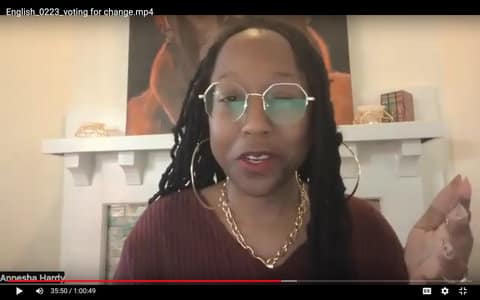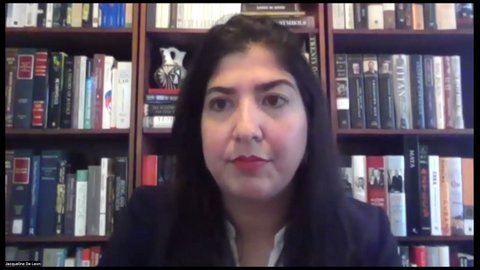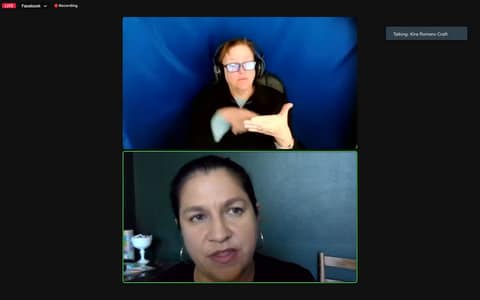
05 Mar ‘Your Vote … Gives You Power,’ Advocate Says

“Voting is not just about choosing a candidate. It is about shaping the future of our communities. It is a powerful tool for expressing our values and driving change,” said Alabama Values executive director Anneshia Hardy.
By Danielle Parenteau-Decker
It is Super Tuesday. More people will cast a vote in a primary or caucus on this day than any other this year. But a large portion of the electorate probably won’t be among them.
Voters of color are less likely to be a part of the political process whether that’s because they have been shut out of it or they choose not to participate. Some say that many don’t vote because they believe it just doesn’t matter. They don’t see the point or think it will make a difference in their daily lives.
But Anneshia Hardy, executive director of the nonprofits Alabama Values and Alabama Values Progress said this attitude is “an oversimplification that really fails to acknowledge the deeper issue at play.”
>>>Read: Obstacles Exclude Disadvantaged Voters from Democratic Process
She and other panelists in a Feb. 23 Ethnic Media Services national news teleconference said the choice not to vote is rooted more deeply in the belief that “the system’s not designed for us,” as Ernie Serrano, a voter engagement organizer with Strategic Concepts in Organizing and Policy Education, put it.
“I think it’s critical to recognize that many of these voters are disappointed not because they undervalue their vote,” Hardy said, “but because they are aware of the systemic injustices and political failures that persist despite their participation in the electoral process, and their skepticism is often rooted in their lived experiences.”
To keep these voters engaged, Hardy said, it is vital to address the “legitimate concerns that they have about the democratic process.”
>>>Read: Experts Address Doubts About Election Process
As part of their efforts to tackle those concerns, the panelists use different approaches to educate marginalized voters about the political process and try to get them more involved.
Immigration attorney Debbie Chen said she wants people to understand that “your vote, essentially, gives you power,” and “power is simply the ability to influence things to get things done.”
She said that people often only think about the “big races” for president, governor or even mayor “when, in fact, things that are going to impact people’s lives are really all these down-ballot races, these local officials.”
In local races, how you vote “directly impacts where you live, whether it’s where the roads get built, where the schools get built, which areas get nice sidewalks and which areas have open ditches,” Chen said. “Those are all things that literally come down to ‘Do you vote?’ ”
>>>Election 2020: Richmond Voters Focus on Local Elections, Keep Eye on Presidency
But as important as it is, she wants people to understand that the electoral process does not begin and end with voting.
“It actually starts with the census,” she said. “It’s not just simply come election time, go vote, because the census and the redistricting that happens — redistricting is actually the best way to conduct mass voter suppression.”
Every 10 years, a census is conducted across the U.S. to determine estimated population counts — estimated because not everyone gets counted. Then, those numbers are used to draw political boundaries. It is supposed to be done so that each resulting district represented by a particular office has about the same number of people. But the process is often manipulated — in what is known as gerrymandering — to ensure that certain types of people are grouped together or spread apart, depending on how those in power want to see elections go.
>>>From the Archives: Voting Districts Are About to Be Redrawn. Here’s Why It Matters
“The importance of voting, literally, it is making sure that our people get counted, that we don’t get racially gerrymandered out where our vote becomes diluted,” Chen said, “and making sure that people understand when you’re voting it is about wielding power and influencing who gets to decide how your tax dollars gets invested in your community.”
Hardy said she has heard from many people that they are tired of just being told “your vote matters.” And Chen said messages about the importance of being counted sometimes “don’t resonate or translate into other languages with the same meaning and context.”
Instead, Chen focuses on why it is important, and talking about money is a big part of that.
“Money is the universal language,” she said. “Everybody understands money.”
Hardy also said it is important to “craft messages that resonate, that highlight the direct impact of policy decisions on their lives and narratives that connect the dots, and by connecting the dots between voting and these tangible community outcomes, we can inspire actions in civic participation like voting.”
To encourage young people to cast their ballots, she said her organizations work to make “voting relatable by connecting it to issues that matter to them such as social justice, healthcare, education.”
Because young adults are one group, in particular, that she said is frequently “questioning the impact of their vote.”
When she hears that, she said she always tells them the same thing: “Voting is not just about choosing a candidate. It is about shaping the future of our communities. It is a powerful tool for expressing our values and driving change.”
>>>Read: Attacks on Voting Rights Evoke Jim Crow Era
Serrano addressed the feeling some people have that “it’s already rigged for the powers that be to win every election.”
“But that’s not necessarily true,” he continued. “There’s been gains in changing [things], but not as fast as we need it.”
And as those gains have been made, many in power have pushed back “to maintain power at any cost,” Serrano said. “One of the strongest tools that they’ve used is racism, institutional racism.”
Hardy said that disinformation and misinformation, as well, “are a significant threat to voter education and [get out the vote] efforts,” specifically mentioning “deceptive tactics that are being used to suppress Black voters.”
>>>Read: Vaccine Disinformation Preys on Black Community’s Well-Earned Distrust
Panelists also addressed how the normalization of hate has endangered voter participation and the political process. Chen, who spoke about people driving around polling places in trucks to try to intimidate voters, called it “a threat to democracy.”
To find out more about voting in Contra Costa County, visit contracostavote.gov.






No Comments